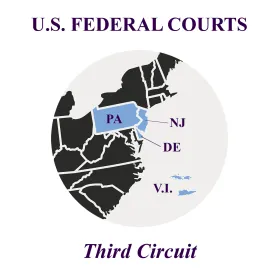A New Jersey District Court Judge has ruled that the March 2020 federal liability immunity statute for pandemic-related countermeasures does not create a basis for federal jurisdiction, resulting in the remand of two COVID-19-related personal injury actions.
The Andover, NJ, Nursing Home Facilities
On March 26, 2020, two nursing homes in Andover, New Jersey, became aware of a COVID-19 outbreak in their facilities. In the following months, 80 residents of the facilities died, allegedly from COVID-19. The families of four deceased residents filed wrongful death and medical malpractice claims against the Andover facilities in New Jersey state court. The plaintiffs alleged that the facilities failed to undertake a wide range of COVID-19 safety precautions, including monitoring visitors and employees, providing appropriate personal protective equipment (“PPE”), and properly executing mitigation protocols such as social distancing.
The defendants removed the cases to the District of New Jersey based on federal question jurisdiction, arguing that the plaintiffs’ claims were completely preempted by a federal statute, the Public Readiness and Emergency Preparedness Act, 42 U.S.C. § 247d-6d, 247d-6e (2006), amended in spring 2020 for the COVID-19 emergency (the Preparedness Act for Medical Countermeasures Against COVID-19, 85 Fed. Reg. 15198 (Mar. 17, 2020)) (together, “PREP Act”). The PREP Act provides liability immunity to health care providers, government actors, manufacturers, distributors, and other enumerated groups against negligence claims arising from the use of COVID-19 “covered countermeasures,” including PPE.
The plaintiffs moved to remand the cases back to state court, and on August 12, Judge McNulty granted remand in both Estate of Joseph Maglioli, et al. v. Andover Subacute Rehabilitation Center I, et al, Case No. 20-6605 and Estate of Wanda Kaegi, et al v. Andover Subacute Rehabilitation Center I, et al., Case No. 20-6985.
PREP Act Does Not Preempt State Law Negligence Claims Nor Require a Federal Forum
Generally, the implication of a federal statute as a defense to a claim (as opposed to affirmatively in a plaintiff’s complaint) cannot support the exercise of federal jurisdiction—except where the federal statute thoroughly preempts the governing state law. In the Andover nursing home cases, the defendants argued that the PREP Act operates to provide express, field, and conflict preemption. All these arguments were rejected.
First, Judge McNulty rejected the defendants’ argument that the PREP Act expressly preempts the plaintiffs’ claims, finding the statute only provides exclusive federal jurisdiction in the USDC District of Columbia for claims arising from willful misconduct of a covered person. See 42 U.S.C. §§ 247d-6d(d)(1), 247d-6d(e)(1).
Second, field preemption was rejected because the Court agreed with the plaintiffs that the PREP Act does not wholly occupy the field of negligence or malpractice claims related to COVID-19. While the PREP Act limits the range of plaintiffs’ claims, Judge McNulty found it specifically applies to the use of certain countermeasures and is not ambiguous in limiting its application. Moreover, various states—including New Jersey—have issued executive orders to fill gaps left by the PREP Act, providing for immunity for civil liability sustained as a result of acts or omissions undertaken in good faith in the course of providing services in support of states’ COVID-19 responses.
Third, conflict preemption arises when an actor cannot simultaneously comply with a federal and a state rule, or the state law poses an obstacle to Congressional objectives. Judge McNulty found this doctrine inapplicable because the plaintiffs did not seek a remedy in conflict with the PREP Act, again emphasizing that the Act governs only the regulation, manufacture, and use of certain covered countermeasures.
PREP Act Immunity Is Limited to the Use of Covered Countermeasure Materials, and Does Not Encompass All State Law Negligence Claims
PREP Act jurisprudence is extremely limited, and Judge McNulty’s discussion of two of the three well-known PREP Act cases provides further insight on its context in COVID-19 cases for practitioners. In particular, the Court agreed with the plaintiffs that PREP Act immunity did not apply to the alleged failure to usecovered countermeasures such as PPE, but instead would apply only to the use of those materials; nor would it apply to a facility’s failure to employ procedures such as social distancing.
The defendants relied heavily on Parker v. St. Lawrence Cty. Pub. Health Dep’t, 954 N.Y.S.2d 259 (N.Y. App. Div. 2012). In that case, parents of a minor who received an H1N1 vaccine at school without their consent filed suit against the school district. The PREP Act preempted the parents’ claims because the vaccines were purchased pursuant to a federal contract and administration of the vaccine was expressly listed in the PREP Act as a covered countermeasure. By contrast, Judge McNulty pointed out that the Andover Plaintiffs allege injury arising from the defendants’ failure to take proper countermeasures, such as the under-usage of masks and other PPE.
Similarly, the court rejected the defendants’ efforts to distinguish Casabianca v. Mount Sinai Medical Center, No. 112790/10, 2014 WL 10413521 (N.Y. Sup. Ct. Dec. 2, 2014). In that case, the plaintiff claimed his physicians failed to administer the covered countermeasure vaccine. The court rejected Casabianca’s claim, explaining that the PREP Act requires that a covered countermeasure be administered for the immunity provisions to apply. The defendants argued Casabianca was inapplicable because the Andover facilities did use masks. The Court again agreed with the plaintiffs, framing the issue as the defendants’ alleged inaction rather than sparse use of PPE. The plaintiffs claim that the quality of care they received fell short of what a nursing home should have done to protect the patients from infection, which does not fall under the PREP Act.
Notably, while Judge McNulty ruled that the PREP Act does not require a federal forum for state-law tort claims, he did not rule on whether the defendants are entitled to a PREP Act defense.




 />i
/>i
